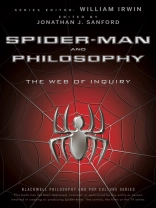Untangle the complex web of philosophical dilemmas of Spidey and
his world–in time for the release of The Amazing
Spider-Man movie
Since Stan Lee and Marvel introduced Spider-Man in Amazing
Fantasy #15 in 1962, everyone’s favorite webslinger has
had a long career in comics, graphic novels, cartoons, movies, and
even on Broadway. In this book some of history’s most
powerful philosophers help us explore the enduring questions and
issues surrounding this beloved superhero: Is Peter Parker to blame
for the death of his uncle? Does great power really bring great
responsibility? Can Spidey champion justice and be with Mary Jane
at the same time? Finding your way through this web of inquiry,
you’ll discover answers to these and many other
thought-provoking questions.
* Gives you a fresh perspective and insights on Peter Parker and
Spider-Man’s story lines and ideas
* Examines important philosophical issues and questions, such as:
What is it to live a good life? Do our particular talents come with
obligations? What role should friendship play in life? Is there any
meaning to life?
* Views Spider-Man through the lens of some of history’s
most influential thinkers, from Aristotle, Thomas Aquinas, and
Immanuel Kant to Nietszche, William James, Ayn Rand, and Alasdair
Mac Intyre
Зміст
ACKNOWLEDGMENTS xi
INTRODUCTION 1
PART ONE THE SPECTACULAR LIFE OF SPIDER-MAN?
1 Does Peter Parker Have a Good Life? 7
Neil Mussett
2 What Price Atonement? Peter Parker and the Infinite Debt
22
Taneli Kukkonen
3 ‘My Name is Peter Parker’: Unmasking the Right and
the Good 37
Mark D. White
PART TWO RESPONSIBILITY-MAN
4 ‘With Great Power Comes Great Responsibility’:
Spider-Man, Christian Ethics, and the Problem of Evil 55
Adam Barkman
5 Does Great Power Bring Great Responsibility? Spider-Man and
the Good Samaritan 70
J. Keeping
6 With Great Power Comes Great Culpability: How Blameworthy Is
Spider-Man for Uncle Ben’s Death? 86
Philip Tallon
PART THREE SPIDER-SENSE AND THE SELF
7 Why Is My Spider-Sense Tingling? 103
Andrew Terjesen
8 Red or Black: Perception, Identity, and Self 119
Meaghan P. Godwin
9 With Great Power: Heroism, Villainy, and Bodily Transformation
131
Mark K. Spencer
PART FOUR ARACHNIDS ‘R’ US: TECHNOLOGY AND THE
HUMAN, ALL TOO HUMAN
10 Transhumanism: Or, Is It Right to Make a Spider-Man?
145
Ron Novy
11 Maximum Clonage: What the Clone Saga Can Teach Us about Human
Cloning 159
Jason Southworth and John Timm
PART FIVE YOUR FRIENDLY NEIGHBORHOOD SPIDER-MAN
12 Justice versus Romantic Love: Can Spider-Man Champion Justice
and Be with Mary Jane at the Same Time? 177
Charles Taliaferro and Tricia Little
13 Love, Friendship, and Being Spider-Man 188
Tony Spanakos
14 Spidey’s Tangled Web of Obligations: Fighting Friends
and Dependents Gone Bad 200
Christopher Robichaud
PART SIX THE AMAZING SPEAKING SPIDER: JOKES, STORIES, AND THE
CHOICES WE MAKE
15 The Quipslinger: The Morality of Spider-Man’s Jokes
217
Daniel P. Malloy
16 The Sound and the Fury behind ‘One More Day’
231
Mark D. White
17 Spider-Man and the Importance of Getting Your Story Straight
243
Jonathan J. Sanford
CONTRIBUTORS 257
INDEX 263
Про автора
Jonathan J. Sanford is a professor of philosophy and Chair of the Department of Philosophy at Franciscan University of Steubenville.
William Irwin is a professor of philosophy at King’s College in Wilkes-Barre, Pennsylvania. He originated the philosophy and popular culture genre of books as coeditor of the bestselling The Simpsons and Philosophy and has overseen recent titles including Batman and Philosophy, Alice in Wonderland and Philosophy, and Watchmen and Philosophy.












